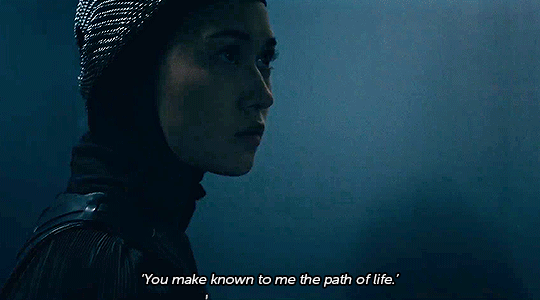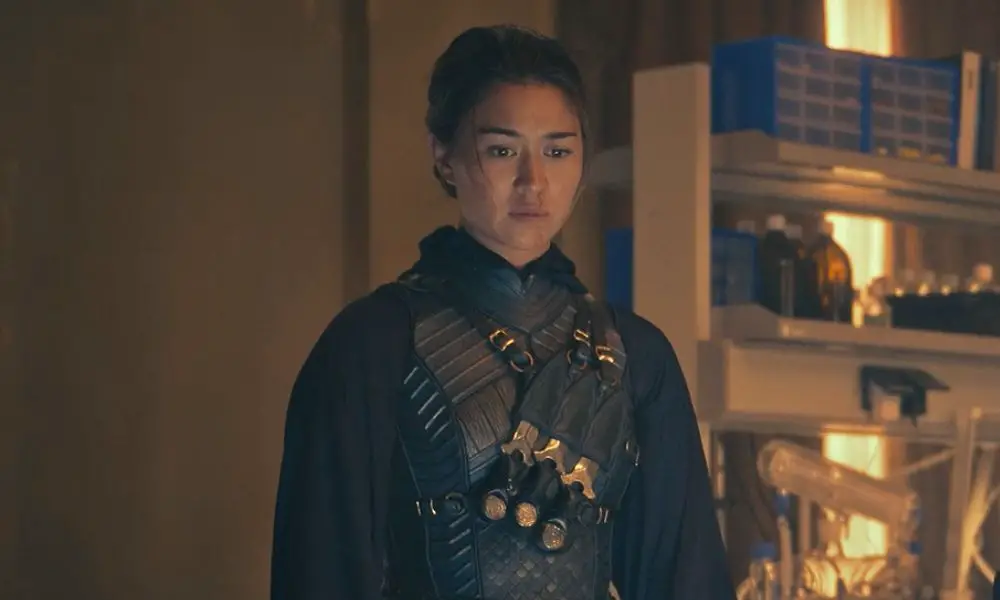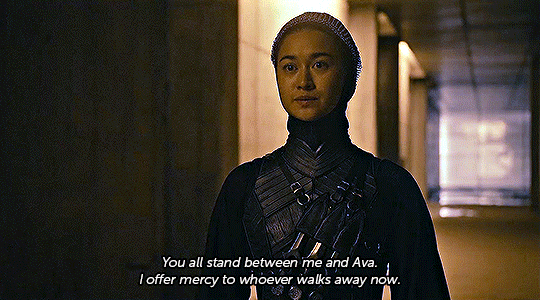- Sister Beatrice and the Church (Part 1)
- Sister Beatrice and the Church (Part 2)
- Sister Beatrice And The Church (Part 3)
SPOILER WARNING: This article contains full spoilers from Warrior Nun Season 2.
The two-and-a-half years since the 2020 release of Warrior Nun gave many of us here at The Fandomentals time to ponder over the show and its characters, enough to create a five-part series on the show as a trauma narrative and discover new tropes. In my case, it was enough time to overanalyze Sister Beatrice’s character through the lens of Catholic dogma.
In parts 1 and 2, I used Catholic views on homosexuality, sin, and penance as framework to view Beatrice’s relationship to the Church and her vows. I’ve posited that Beatrice took vows as a form of penance for the perceived flaw of homosexuality as well as a form of self-repression. I also dove into the way Beatrice looks at others’ actions, particularly Ava’s, judging them through the lens she’s been so harshly judged by throughout her life.
I’m happy to report that my analysis still holds up through season two (at least I think so). I was also right about Beatrice leaving the Church as her path forward toward self-acceptance! In this article, I’ll look into how Beatrice’s relationship with the Church evolves in Warrior Nun season two, taking my initial reading as true.
While my first analysis centered on why Beatrice joined the Church in the first place, this one will focus on how she deals with the aftermath of the events of season one finale.
Adriel Shifts Beatrice’s World on Its Axis
The revelation of Adriel’s true nature doesn’t just expose a foundational lie of the Order of the Cruciform Sword (OCS) but also exposes the possibility — near certainty — that Warrior Nun’s in-universe version of Catholicism is also built on a lie. As such, everything Beatrice has built her life upon and which she’s relied on for certainty and comfort is also a lie. Who she is, how she’s valuable, and whether her soul is safe are all up in the air.
This is earth-shattering for Beatrice, especially given the (likely misguided) reasons why she joined the Church. One could even imagine such a paradigm shift would have a person crawling in a corner in a fetal position for a good long while.
However, Beatrice is Beatrice, and composure and stoicism are some of her most notable descriptors. On top of that, there’s so much more happening around and to her in season two — from Adriel’s cult to great efforts invested in suppressing her feelings for the resident Glorious Dumbass — that she doesn’t have much time to ponder on what it all means for her faith.
Still, Beatrice spends the entire season one wrong move away from bursting at the seams. The signs are subtle and sprinkled all throughout the season, paying off in 2×07, when the dam finally breaks. I have to commend Warrior Nun’s writers for their attention to detail for every character, but particularly for how thoughtfully they laid the groundwork for Beatrice to lose her religion (pun absolutely intended) this season.
Religious Trauma Syndrome
Religious Trauma Syndrome (RTS) is a condition suffered by people who struggle to leave a dogmatic and authoritarian religion. In addition to Catholic dogma, I also used aspects of RTS to try to understand Beatrice’s attitudes and behaviors in my initial analysis. Like I mentioned in Part 1, I’m not here to diagnose Beatrice with it, but rather to use it as a framework in the analysis of her character.
RTS can have a variety of symptoms ranging from cognitive to affective. The most relevant to my current analysis of Beatrice are identity confusion, anger, guilt, lack of meaning, interpersonal dysfunction, and dissociation. While I won’t be calling back symptoms during this analysis, it’s useful to keep this in mind moving forward.
Avoidance
Under more normal circumstances (even by the standards of Warrior Nun’s universe), Beatrice would have probably had a slower process of questioning her vows and faith with the catalyst of Ava; not just her feelings for her, but who Ava is and how she starts to change Beatrice’s worldview. However, Adriel and the existence of the Other Side speed up this process rather rudely.
Therefore, Beatrice’s crisis of faith isn’t entirely coming from self-discovery and internal reflection. She’s forced to face real, breathing proof that scripture is likely wrong, and if it’s wrong about angels, what else is it wrong about?
In season 1, Beatrice makes several allusions to her faith. From “you make known to me the path of life” in 1×04 to advising Camila to listen to God’s messages in 1×07, the narrative signals to us that Beatrice’s actions are guided by her faith in God, if not the Church. The example from 1×04 is particularly relevant, as she invokes God’s guidance just before covering her eyes with chainmail to fight. That’s a “Jesus take the wheel moment” if I’ve ever seen one; a literal expression of blind faith from Beatrice.

When we find Beatrice again in season two, she’s less inclined to pray by herself or to center her advice on God. Instead, she’s 100% mission-focused. While she crosses herself a couple of times as an afterthought, while focused on something else (once in 2×02 and once in 2×03), we find a significantly less pious Beatrice in Switzerland. She seems to be using her duty to train Ava partly as a distraction from the potentially debilitating doubt the events at the Vatican are sure to bring up. At the same time, she seems the tiniest bit more relaxed, less rigid than before. For example, after it took her three tries to say “freaking” in 1×09, she curses without so much reservation in 2×01 and 2×03, when she’s alone with Ava… but let’s save Ava for last.
Beatrice’s ease evaporates as soon as they reunite with Mother Superion and Camila in Madrid. She gives another hint of her avoidance when Yasmine reveals the Crown of Thorns to be a “device from Adriel’s realm,” prompting ever-inquisitive Ava to wonder what that means for Jesus. “Let’s… not go there,” Beatrice tells Ava, with a hint of discomfort.
Beatrice has been avoiding the full implications of everything that has happened, aided by the world-ending stakes that necessarily take precedence over any uneasy feelings. There’s simply no time to stop and think, because the ensuing crisis would jeopardize the mission, no question. That’s true not just for her, but for the other members of the OCS. Camila brings it up in 2×05.
Camila: If Adriel is real and all the books were wrong… do you ever think about that?
Beatrice: Of course.
Camila: I know it’s terrible, but sometimes it’s even hard to pray.
Beatrice: Yes. I understand that.
Camila: Mother Superion never talks about it, but I know it affects her. And now you.
Beatrice: Don’t worry about me. I’m fine.
Camila: You’re not much of a liar […].
Camila implies there’s more going on with Beatrice than herself and Mother Superion, which harkens back to why Beatrice took vows in the first place, and to Ava. Even though Camila and Superion are affected by what’s happening, their faith in God and the comfort they find in prayer don’t waver. Both of them are shown praying throughout the season (Superion inviting them to pray together, Camila praying in solitude). The contrast to Beatrice’s lack of prayer becomes starker; she never initiates prayer for herself throughout the season.
Matthew 27:46
One moment that might seem small and thus be overlooked happens in 2×03, when the team does reconnaissance on the museum. The moment is mostly focused on Camila and Beatrice’s relationship, and how Camila has grown since Beatrice acted as her mentor figure in season one. Beatrice frets about the plan, and Camila wisely points out that plans never work. Then, she points at Titian’s ‘The Burial of Christ’ which is behind them, depicting Jesus’ dead body as he’s placed in his sepulcher.
Camila: Even he couldn’t control everything.
Beatrice: God, why have you forsaken me?
There’s a bit of a pause when Beatrice is looking at the painting, and she utters the phrase in a sort of whisper, not really directed at Camila at all. Camila doesn’t seem to notice, focused still on defending her competence.
Beatrice is invoking Matthew 27:46, one of the most famous Bible passages. Jesus utters these words from the cross, in the single moment his faith wavers during the Passion. The passage humanizes him, likening him to us, when we face insurmountable suffering and succumb to hopelessness.
In the Catholic view of the world, pain and suffering hold great meaning. Although there’s debate within the Catholic Church itself, a common belief is that suffering can be redemptive. This is partly where the idea of penance comes from. Through penance, pain can have a greater purpose, and it’s worth it because of that purpose.
The pain endured by Jesus during the Passion was part of a greater plan: saving humanity. In a similar vein, doing penance for one’s sins has a specific purpose on a smaller scale, which can range from asking for favor or mercy. Since we’re accepting the thesis that Beatrice took vows partly as a form of penance, her pain was meant to have purpose too. Becoming so skilled at so many things and suppressing her want of anything for herself are meant to give her value and “save her immortal soul,” as she herself put it.
But what if it doesn’t? What if it never did? She understandably feels forsaken, abandoned to an uncertain fate. If she’s not careful, she might succumb to that hopelessness. Without that which she’s clung on to for dear life, she’s untethered, and the only thing she has left in the form of worthiness is her death grasp on duty and mission, which is growing more and more tenuous as her feelings for Ava grow. At least, that’s how she sees herself.
Interlude: Beatrice’s Worthiness
Another moment that’s very revelatory for Beatrice is 2×07. While her scene with Camila highlights what she’s feeling now, Mother Superion’s death scene showcases who Beatrice is at her core, what remains even when faith wavers and she loses hope in it and, since her identity is so tied to it, she inevitably loses faith in herself.
The only time Beatrice invokes God unprompted and initiates prayer is to comfort Mother Superion as she dies.
Beatrice: When you get to Heaven, God won’t look you over for victories or medals but for scars.
[…]
Beatrice: Let the lord who frees you of sin save you and raise you up.
At this point, the narrative has already peppered in many clues to how unmoored Beatrice is in regards to religion and her relationship with her faith. However, Beatrice is still an empathetic person, a caretaker, and she’s willing to put her discomfort aside and sincerely offer reassurance to Mother Superion. As Superion tells Ava in 2×08, this speaks to the core of Beatrice’s worthiness.
Beatrice’s crisis of faith is too new at this point, and she hasn’t had time in-universe or plot-wise to even begin to unpack it. Yet, the narrative finds time to show us what Beatrice can’t see yet. She has inherent value as a human being, and she’s also gentle, empathetic, and warm. Her selflessness manifests itself most when others are in distress, like offering a prayer to help Mother Superion have a peaceful passing or realizing Yasmine needs a break, and relieving her of her duty in 2×08, to name some late-season two examples.
The Dam Breaks
Mother Superion: We should pray for Camila, Yasmine, and everyone we’ve lost.
Beatrice: To hell with that. […] I’m truly grateful that you’re alive, I am. But Adriel is literally sucking our prayers out of the air. I mean, who are you even praying to?
Anyone who’s ever experienced a crisis of faith can probably relate to Beatrice’s distress. She’s being mellow about it, to be honest. God, why have you forsaken me? Who are we even praying to? The doubts that have been bubbling under the surface are foundational, and they relate to the very core around which Beatrice has built her entire existence. So, when the cracks give and the dam breaks, Beatrice finds herself out of balance, confused, and inevitably angry.
As heartbreaking and frustrating as the Beatrice and Ava scene in 2×07 is for many, her dissociating from her feelings for Ava, distancing herself from them by focusing on the mission, was almost inevitable as everything that has been brewing within Beatrice comes to a head. After all, Ava can’t help with this — as perceptive and intuitive as she is — and in the current circumstances, her presence and involvement confuse Beatrice even more.
It’s relevant here that Beatrice didn’t come to this moment organically. Most people encounter these doubts as they go through life and meet new people. Usually, they choose to consciously explore new ideas and reflect on them. Beatrice didn’t get a chance to explore and come to conclusions on her own. She’s hardly had a chance to breathe in the past few days. In the scene prior, she’s just witnessed a miracle that only God is supposed to be capable of performed by an atheist with an object whose origin is becoming murkier and murkier.

This piles on top of Beatrice betraying her duty just hours before by putting her feelings and Ava’s life over the fate of the world. As the mission was her number one distraction for the crisis underneath, everything inevitably crashes together — Who are we even praying to? God, why have you forsaken me?
The Ava Factor, Times a Million

Because a crisis of faith isn’t enough, while all that’s happening in the background, Beatrice is also dealing with her feelings for Ava. Thus, keeping her mission as the first line of defense becomes untenable once Ava’s life is more directly on the line via Michael’s plan, which, after the events of 2×06, seems to be their only option.
As discussed in my original analysis, her conflict regarding Ava doesn’t just stem from her increasingly tenuous sense of duty. It also overlaps with the faith situation, internalized homophobia, and Beatrice’s own sense of self-worth.
Beatrice initially judges Ava with the lens often used on her. And Beatrice sees herself in a very harsh light, which we can gather from subtle clues and from not-so-subtle exposition (“I became skilled at so many things just so I would still have value…”). Beatrice sees her value as inherently tied to her skill, usefulness, and ability to fulfill her duty.
Ava, of course, doesn’t see Beatrice this way, but while Beatrice has stopped judging Ava through the dogmatic lens used on her, she still can’t stop seeing herself that way. After all, indoctrination isn’t easy to shake, and Beatrice hasn’t even begun a healing process; she’s just barely left the denial phase.
And yet! Beatrice feels more comfortable than ever she realizes letting Ava see over her carefully constructed walls. Since she first opened up to Ava in 1×08, Beatrice has gotten sloppy and let her connection to Ava strengthen, opening herself up to the point where, in 2×01, she agrees to drinking with Ava rather easily. She’s never drunk before, but she feels safe enough to lose inhibitions in front of Ava.
Then, in what’s perhaps one of the most significant Ava and Beatrice scenes in the entire show, Beatrice and Ava walk out of the bar after dancing the night away, and Beatrice openly discusses Adriel. She’s vulnerable, unsure, and she not only discusses Adriel’s nature with Ava… she asks Ava for answers, seeking reassurance from her. She listens carefully and thoughtfully considers Ava’s opinion. This isn’t just significant, it’s monumental for Beatrice. She avoids prayer, gives Camila curt answers, and stops group discussions. But here, when she’s alone with Ava in the safety of their little Swiss town, she lets herself be unsure.
Even though she buttons back up once she’s back in her habit, that familiarity remains throughout the season, as Ava and Beatrice turn to each other for comfort and reassurance constantly. This is something Beatrice is clearly doing unconsciously. She still can’t fully embrace her feelings, but as long as they remain safe and tucked into her chest, she expresses them with this inherent trust and vulnerability that she reserves only for Ava.
In 2×04, we get a peek into where Beatrice’s mind is when it comes to her sexuality. The fog of fear, Adriel’s third plague, shows her Ava, menacingly taunting Beatrice about her.
Hallucination!Ava: It’s too late Bea. There’s no point in hiding. I know what you are.
Even though she knows, rationally, that Ava doesn’t hate her for her sexuality (not least because Ava has told her and shown her), the fear lingers. Her crisis of faith finally comes to the surface in large part because she lets herself act on her feelings. Perhaps if fewer things were happening, Beatrice would fare better in handling everything. But as it is, it’s a lot for any human to process, let alone someone like Beatrice, who’s repressed her emotions so much she’s not practiced at them anymore.
As much as any Avatrice shipper would love for them to just ‘fess up and kiss, embracing these feelings is understandably hard for Beatrice, and Warrior Nun treats her journey respectfully and as realistically as an eight-episode season allows. Dogmatic and authoritarian religions have lingering effects on people who leave them, even years after the fact, and at this point, Beatrice is still in it, if not for long.
Beatrice Renounces Her Vows
Ava shifts Beatrice’s world on its axis (again) in 2×08, when she kisses her. Even as she’s starting to come to terms with her feelings and the idea that she’s willing to risk the world for Ava, duty be damned, Beatrice’s low sense of self-worth wouldn’t allow her to realize Ava would do the same for her.
When it becomes clear Ava does reciprocate her feelings, something shifts. Beatrice no longer hides her true priorities. In yet another significant moment that directly parallels 1×04’s hallway fight, Beatrice faces off against a group of armed men. But instead of asking for God’s guidance, she invokes Ava’s name. Regardless of the outcome of the conflict, I believe this is the point of no return when it comes to Beatrice and her vows. Leaving the Church becomes an inevitability as the last layer of denial comes undone.

Everything happens fast after the kiss, for Beatrice and the audience, and the show doesn’t exactly have time to flesh out the resolution. All we know by the end is that Beatrice seems to find some form of peace in the decision to leave the OCS and renounce her vows.
There are many things left open-ended when it comes to Beatrice’s relationship to religion and her faith. Seeing Reya in the flesh, for example, is bound to raise more questions than answers. Not to mention letting go of the denial she’s clutched to for dear life the whole season is only a first step, not a conclusion. As much as leaving the Church can be a relief, it can also be the start of a struggle, and for Beatrice, there’s a lot of things to deal with on top of her crisis of faith — letting go of Ava not the least of them.
This isn’t the end of Beatrice’s story (better not be!); she has to do the hard work of untangling her identity from what has literally defined her. Plus, like Adriel before, Reya and the forecasted Holy War have the potential to shake the world — and specifically Beatrice’s — yet again. Perhaps, even more fundamentally.
Images courtesy of Netflix.
Have strong thoughts about this piece you need to share? Or maybe there’s something else on your mind you’re wanting to talk about with fellow Fandomentals? Head on over to our Community server to join in the conversation!

